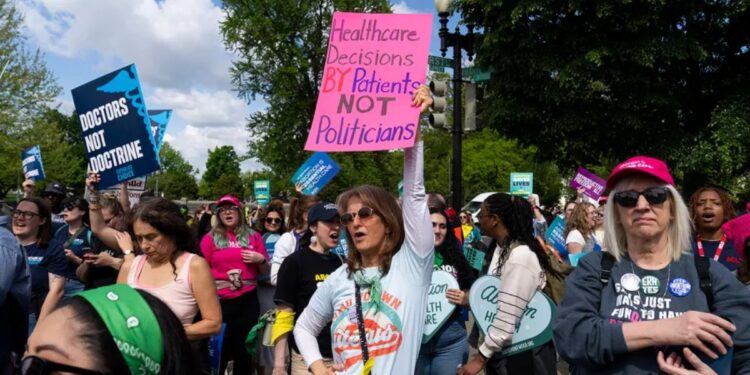Abortion politics threatens Florida Republicans’ chances in crucial state legislative contests, despite widespread voter backlash.
The Florida Supreme Court upheld a 15-week abortion limit earlier this month, paving the way for the state legislature’s six-week ban from last year to go into effect.
As resentment over the ban develops, a few weak Republican state senators who supported the six-week limitations may face defeat in November.
“Given how unpopular this new policy is and the fact that there’s a constitutional amendment question regarding abortion on the ballot, I think there’s some risk for down-ballot Republicans,” former Rep. Carlos Curbelo (R-Fla.) told The Hill.
Florida has emerged as a focal point in the abortion access debate, with a number of states restricting abortion access following the reversal of Roe v. Wade.
The state Supreme Court ruled earlier this month that the controversial 15-week abortion ban could go forward, arguing that a privacy protection in the state Constitution does not apply to abortion.
The state legislature imposed a six-week limit on medical treatment last year, but the courts’ progress over the 15-week prohibition prevented its implementation.
The six-week restriction will take effect on May 1, quickly transforming the face of abortion access in the Sunshine State. Simultaneously, proponents of abortion rights achieved a victory this month when the Florida Supreme Court decided to present a ballot issue to voters this autumn, with the aim of enshrining abortion provisions in the state Constitution.
GOP state Reps. Rachel Saunders Plakon in Seminole County, Susan Plasencia, who represents parts of Orange and Seminole counties, David Smith in Seminole County, and Carolina Amesty, who represents portions of Orange and Osceola counties, were among those who voted in favor of the six-week ban. Not all of them have announced Democratic challenges.
Nonetheless, Democrats believe some of these Republican state legislators will be vulnerable to voting on the six-week moratorium. If this is the case, it demonstrates how abortion politics are rocking redder states on a more local level.
State Rep. Anna Eskamani (D), who previously served on the board of Planned Parenthood, said, “I do think for all these Republicans that voted essentially with [Gov. Ron] DeSantis in an attempt to boost his ambitions for the White House—they haven’t only endangered women and abortion seekers, but they’ve also endangered their political careers, and it will be very clear on the campaign trail how out of touch they are, even with their own base.”
However, some analysts, like Michael Binder, faculty head of the University of North Florida’s Public Opinion Research Laboratory, are unconvinced that vulnerable GOP state lawmakers will face further consequences for voting on the six-week abortion ban alone.
According to Binder, “there is a ballot measure that is out there that expands and enshrines abortion rights into the state constitution, and that is certainly something where you could see some folks maybe voting for a Republican but also voting ‘yes.'”
“It could also maybe motivate a few more people to come out that might otherwise not come out,” he said. “Not a lot, but a few.”
Some Republicans are also suspicious, citing variables such as candidate quality and other popular topics among voters.
“Overall, having the six-week abortion ban and reproductive rights amendment on the ballot is a net plus in terms of Democratic voter turnout,” said Justin Sayfie, a Republican strategist based in Florida. “But the challenge for the Democratic Party in Florida in these state House and state Senate races is to put up viable candidates.”
Florida Democrats say they are ready for the battle, beginning a recruiting drive early this month to find candidates for every state and federal legislative position.
Republicans, however, contend that the issue also pertains to the two candidates running for Florida this cycle: President Biden and former Rep. Debbie Mucarsel-Powell (D-Fla.), a Senate candidate.
“They have two weak candidates [on the statewide ballot].” “They need something else to energize their voters,” Sayfie explained.
Biden and Mucarsel-Powell have both identified abortion as a crucial campaign topic in the state. The president criticized Florida’s six-week abortion ban, set to take effect next week, during a campaign trip to Tampa earlier this week. On the day the ban takes effect, Vice President Harris has scheduled remarks in Jacksonville.
“It’s not that we have to make it an issue; people have already done so,” said Florida House Minority Leader Fentrice Driskell (D). “Voters have shown us that this is the formula to connect with them; to be able to have the credibility to ask for their vote, you have to be able to say that you authentically say that you care about the issues that they care about.”
Polling indicates that the topic is undoubtedly on voters’ minds.
An Emerson College poll earlier this month revealed that 42 percent of Florida voters plan to vote in favor of the amendment to enshrine abortion rights in the state’s constitution in November, while 32 percent remain unsure. 25% said they would vote against the measure.
Earlier this month, a separate USA Today/Ipsos poll found that 57% of respondents would support expanding access to abortion through the ballot item.
Republicans, however, believe that other factors will come into play in November, particularly among swing voters.
“That’s the danger for Democrats; they talk so much about abortion and reproductive rights that voters think, ‘Gosh, they don’t care about these other issues that I care about,'” Sayfie told CNN.










